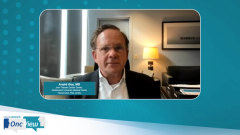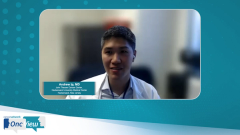
BRUIN Trial: Pirtobrutinib for Patients With MCL
Expert oncologists give an overview of the BRUIN trial and discuss pirtobrutinib as a treatment for patients with mantle cell lymphoma.
Episodes in this series

Transcript:
Andrew Ip, MD: Going further on novel approaches, you mentioned Michael Wang, MD, at MD Anderson Cancer Center in Houston, Texas, and there was obviously the BRUIN trial that looked at the noncovalent BTK inhibitor pirtobrutinib. I was just wondering if you could explain to the audience what was interesting from the efficacy or safety and how the approval for pirtobrutinib is going to affect how we treat mantle cell lymphoma.
Andre H. Goy, MD: For the noncovalent BTK inhibitor, we know that the mechanism of resistance for BTK inhibition is at the binding site C481S on BTK, but also PLC-gamma (PLCy2) for example, downstream mutation. And we know that we see the emergence of those mutations in most patients, particularly in mantle cell lymphoma. And the noncovalent BTK inhibitors have had remarkable activity in CLL [chronic lymphocytic leukemia] and mantle cell lymphoma, including in patients who failed BTK inhibitor from progression, not just from toxicity. The data from the BRUIN trial was over 90 patients, the response rate was over 55%, and the CR [complete remission] rate was 20%. It wasn’t a long follow-up, but it was durable in a patient population that would've done very poorly with any kinds of approaches outside of CAR T-cell. This is interesting, and it is approved in mantle cell lymphoma and will definitely be a significant player because as I mentioned in CLL, it’s very promising, including in BTK failure.
The next step is really to see what the next question comes up as we have an evolving [treatment] paradigm and more choices of BTK inhibitors. And I think that there's an ongoing trial that is trying to compare the noncovalent vs covalent BTK inhibitor, including a phase 3 trial in mantle cell lymphoma.
Andrew Ip, MD: Yes. I think that was leading to the follow-up question, which is how will pirtobrutinib or noncovalent BTKIs impact upfront for BTK naïve patients in mantle cell lymphoma? How are we going to choose which one to give first or which sequence?
Andre H. Goy, MD: I don't think this is a question we have an answer for in CLL either. I am a strong believer that the goal, particularly in mantle cell lymphoma, where the disease is highly genetically unstable and patients develop resistance, having finite therapy with triplets where you can achieve MRD [minimal residual disease] negativity and stop treatment is going to be the future. Hopefully, the ongoing trial will help us identify the subset of patients who would do better with a certain BTK inhibitor, noncovalent vs covalent. I don't think we have the data yet, but stay tuned. Having all these novel options is a good problem to have.
Transcript edited for clarity.
Newsletter
Stay up to date on recent advances in the multidisciplinary approach to cancer.






































